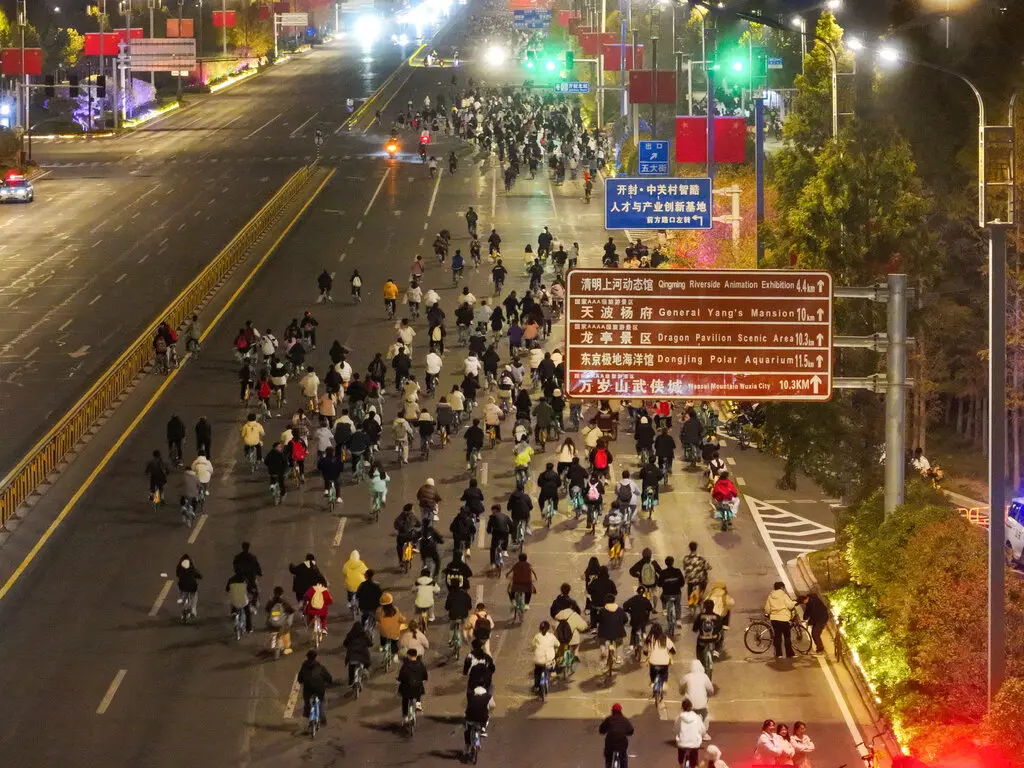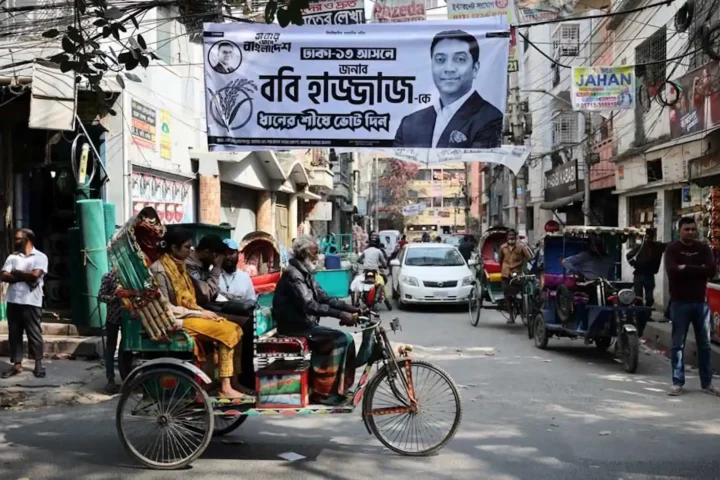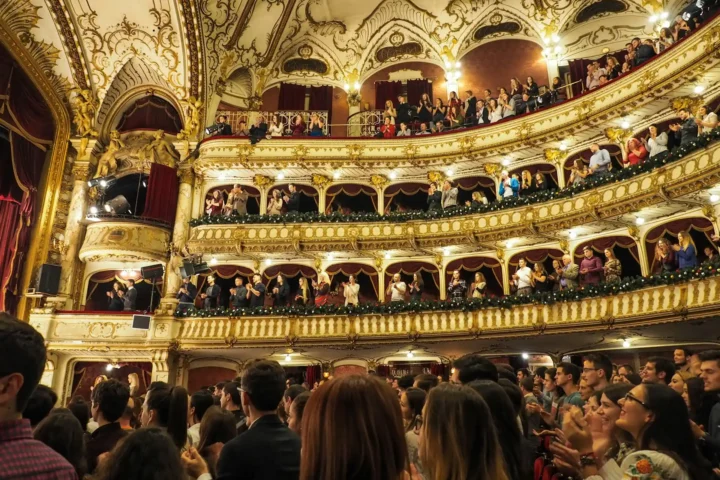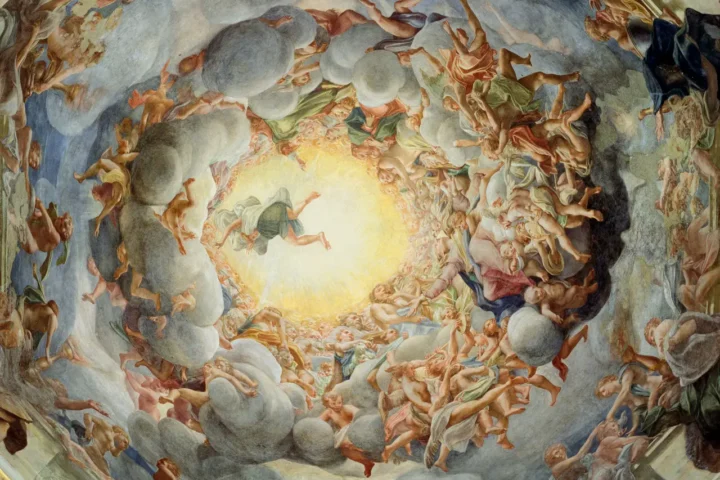On a balmy summer night, under the hum of Zhengzhou’s streetlights, an extraordinary sight emerged: tens of thousands of young people on bicycles, forming a spontaneous convoy of joy and defiance. What started as a whimsical journey for soup dumplings in Kaifeng—a city 40 miles away—evolved into a cultural phenomenon. It was a fleeting yet powerful movement, capturing the unbridled spirit of youth in an era when spontaneity often feels like a relic of the past.
The nightly rides were electric. Students cycled side by side, their laughter mingling with bursts of the national anthem, their paths illuminated by car headlights and the occasional fireworks. Bin Li, a third-year engineering student, described his journey as a transformative experience of camaraderie. “When so many people came together to do something as one, there was a real sense of community,” he said. The anthem swelled in the night air, flag-waving riders leading a chorus of exhausted yet exhilarated voices.
For many, the rides embodied freedom—a rare and exhilarating escape from the weight of academic pressures and lingering pandemic restrictions. The phrase “Youth has no price tag” became a rallying cry, a succinct manifesto of their generation’s desire to seize fleeting moments of liberty and joy. Local businesses, sensing opportunity, leaned into the craze. Tourist attractions adjusted schedules, and free breakfasts awaited the weary cyclists at Kaifeng’s Song dynasty theme park.
Yet, as with many organic movements in China, the celebration soon soured. Authorities, initially supportive, grew uneasy as the rides ballooned to tens of thousands, spilling over into multilane highways and choking traffic. The Kaifeng Public Security Bureau, invoking concerns over safety, closed bike lanes and enforced strict restrictions on shared bikes. What began as a celebration of youthful exuberance quickly became another casualty of China’s broader quest for social stability.
This swift crackdown underscores a deeper tension in modern China. On one hand, the government has long sought to cultivate patriotic youth who are healthy, motivated, and entrepreneurial. On the other, it remains wary of unsanctioned gatherings, no matter how apolitical. The rides symbolized the pent-up energy of a generation shaped by lockdowns and restrictions, yearning for moments of collective release. Yet, instead of channeling this energy into constructive avenues, officials chose suppression, citing traffic jams and hypothetical emergencies as justification.

The irony is palpable. In a country that often lauds collective action and national pride, the night rides embodied both—yet their spontaneity was their undoing. The rides offered a glimpse of the kind of grassroots, unstructured participation that has become rare in a heavily regulated society. These young cyclists, riding for nothing more than a bowl of soup dumplings and the thrill of the night, inadvertently highlighted a growing gap between the aspirations of China’s youth and the cautious pragmatism of its leadership.
This isn’t the first time spontaneous youth movements have sparked unease in China, and it won’t be the last. In the past, similar gatherings around pop culture, sports, or shared hobbies have faced similar crackdowns once they grew too large or too visible. The authorities’ response is often to control, rather than engage, missing opportunities to harness youthful energy for broader social good.
As Dali Yang, a political science professor at the University of Chicago, aptly noted, the rides reveal the authorities’ inability to channel this energy. Instead of fostering spaces for safe, positive expression, the default response is to shut them down. The message is clear: even joy must be regulated.
For participants like Mr. Li, the crackdown won’t erase the memories of those exhilarating nights. But the government’s heavy-handed response has left many wondering about the balance between safety and freedom. Why must every spark of spontaneity be extinguished in the name of order?
Even as restrictions tighten, some riders remain undeterred. Defiantly, they’ve pledged to continue their journeys—if not on wheels, then on foot. Their determination speaks to a universal truth: the spirit of youth is irrepressible, no matter how many roadblocks stand in its way.
In a world increasingly defined by screens and isolation, these rides were a rare manifestation of collective human spirit—a celebration of the here and now. While the authorities may have succeeded in halting the wheels, they cannot erase the ethos of those nights. Youth, as always, will find its way.
And as Mr. Li poignantly observed, “These are the only years in my life where I don’t have to worry about other things, so I have to make memories that will last.”
The authorities may have the power to shut down a road, but they cannot contain the boundless, restless energy of a generation hungry for adventure. In a society where every moment seems preordained, sometimes the simple act of riding into the night is its own form of quiet rebellion.











